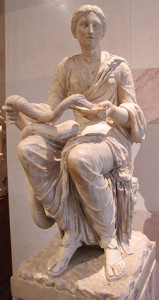The words “pagan,” “witch,” and “heathen,” as with any words with a long pejorative history, require careful reflection on how they are used.
Random House dictionary defines pagan (noun) as
1) one of a people or community serving a polytheistic religion, as the ancient Romans and Greeks.
2) a person who is not a Christian, Jew, or Muslim.
3) an irreligious or hedonistic person.
The Dictionary of Word Origins by John Ayto has this to say about pagan:
The history of pagan is a bizarre series of semantic twists and turns that takes it back ultimately to Latin pagus (source also of English peasant). This originally meant ‘something stuck in the ground as a landmark’ (it came from a base *pag- ‘fix’ which also produced English page, pale ‘stake,’ and pole ‘stick’ and is closely related to pact and peace). It was extended metaphorically to ‘country area, village,’ and the noun paganus was derived from it, denoting ‘country dweller.’ But then this in turn began to shift semantically, first to ‘civilian’ and then (based on the early Christian notion that all members of the church were ‘soldiers’ of Christ) to ‘heathen’ – whence English pagan.
We will leave “heathen” alone today and note that “pagan” originated in Latin and that its association with polytheistic religions relates to the idea of country dwellers and non-Christians. Early Christians tended to be urbanites while rural areas were Christianized much later. “Pagan” could also mean Muslim and sometimes Jew during the Middle Ages and Renaissance. After the Reformation it was also used to refer to a hated Christian sect. Calvinists especially liked to call Catholics “pagans,” referring to the nonbiblical pre-Christian religious elements that became syncretized with Catholicism. “Pagan” essentially referred to a person who was not a Christian, or not considered a true Christian. Less frequently, the word meant a nominal Christian who was not following the tenets of the religion, “an irreligious or hedonistic person.” The professed need to rid the world of “pagans” was used to justify the Crusades as well as violence against Muslims, Jews, rival Christians, stubborn adherents of pre-Christian religions, Christians who clung to animistic practices, and people (mostly women) who were alleged to cavort with the Christian Devil. It was also used to justify expansionist wars against countries which had not yet been Christianized.
From the late sixteenth century on, Christianization of so-called pagans provided the moral grounds for European colonization, which was primarily driven by economic rather than religious concerns. (Interestingly, the economic problems in Europe at this time were caused partly by Christian practices.) Colonists predictably enough branded the polytheistic nature-based religions they encountered in Africa, India, Australia, and the Americas “pagan,” and the word began to return to its rural roots. Now the world was divided into Christians, Muslims, Jews, atheists, and pagans.

In the nineteenth century, as Europe strove to cast off the legacy of religious wars and witchhunts, practitioners of pre-Christian European religions cautiously began coming out of the woodwork. These people faced (and still face!) considerable ridicule, derision, and discrimination, as well as occasional violence, but the danger of imprisonment was for the most part past. In the United States, a religious renaissance blossomed in the Burned-Over District of western New York State, enabled by constitutional rights of religious freedom. Europeans and people of European descent returning to nature-based polytheistic worship began embracing the term pagan.
At the same time, people practicing analogous religions of non-Western origin began objecting to the word. Although initially accepted as the English word for their spiritual practices, many came to see the word as inextricably bound with colonization and rejected its offensive connotation. For aboriginal peoples who became Christian while seeking to retain some of their spiritual practices, the word also created a dilemma, since pagan has always been defined in opposition to Christian.
No one is quite sure who coined the word “neo-pagan,” but it first arose in the nineteenth century and was used occasionally by pagans and non-pagans. The idea behind the “neo-” was to differentiate the old pre-Christian pagans from contemporary pagans. Whether it was scholars or pagans themselves who felt the need to make this distinction is unclear, but in the twentieth century academicians began using the term “neo-pagan” religiously. The idea was to distinguish legitimate religious practices arising before Christianity from the wacky made-up religions that became openly practiced in the nineteenth and twentieth centuries. From the point of view of Pagans, there is no discernible reason why the term should be embraced. No Mediterranean or European person before Christianity referred to themselves or their spiritual practices with this word, so from a scholarly point of view the “neo-” is meaningless. “Neo-” is usually, though not always, used in a political and often pejorative sense. Think neo-Nazi, neoliberal, neoconservative, neo-feminist. We don’t talk about neo-Christians or neo-Jews, although both religions have changed considerably over the centuries. While some Pagans use the term innocently, believing it to be more scholarly, it is an offensive term, deliberately employed to belittle Pagans, and it should be challenged wherever it is encountered.
Today the word Pagan usually refers to any Western polytheistic and/or animistic religion. It includes reconstructed religions such as those that revolve around ancient Egyptian deities, and religions that survived in varying forms throughout Christianity such as Witchcraft. Some other examples of Pagan religions would be Druidry, Heathenism, Wicca, and Strega. I also categorize hybrid religions that arose in the Americas, such as Voodoo, as Pagan, although some would disagree with me. While these religions usually have an West African and Christian base, sometimes with significant Amerindian influence, they also incorporate European pre-Christian beliefs and practices. Paganism refers to religions of Western origin or legacy, but Pagans are not necessarily of European, Semitic, or North African descent. The geographic marker refers to the origin of the belief system, not to the practitioners themselves. Some non-Western people still refer to themselves as Pagan, particularly in Africa and India, but the word is increasingly employed to mean polytheistic and/or animistic religions of European and Middle Eastern origin. A word is needed specifically for these Western religions because, while all animistic belief systems are more similar to each other than they are to Christianity, when we remove Christianity as a touchstone the belief systems begin to look very different.



Comments are closed.